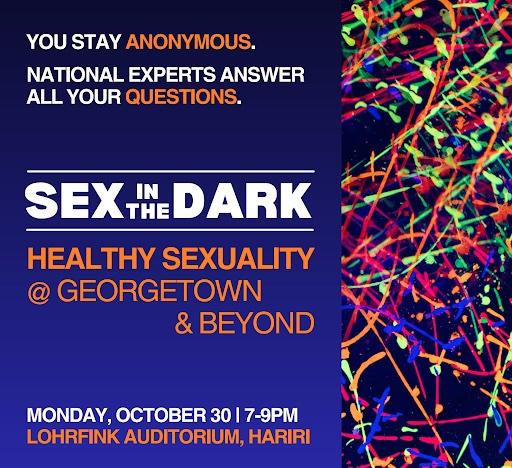Students participated in an anonymous dialogue on campus sexual health at the “Sex in the Dark: Healthy Sexuality at Georgetown and Beyond” Q&A event on Oct. 30.
The annual event was a joint effort cosponsored by multiple centers on campus, including the Student Health Center, Office for Student Health, Health Education Services, the Women’s Center, Catholic Ministry, the Center for Social Justice Research, Teaching and Service and the LGBTQ Resource Center.
The event was part of Georgetown’s OUTober campaign this year, a series of LGBTQ+ programming and events run by the LGBTQ Resource Center and other campus partners and organizations during October, LGBTQ History Month.
At the lights-off, interactive event, attendees wore glow sticks handed out at the door of Lohrfink Auditorium and had the opportunity to win prizes. Attendees used the Wooclap website to ask anonymous questions about sex and sexual health and upvote others’ questions.
Professional sex educators Donté Smith and Dorian Solot from Sex Discussed Here!, an organization that runs sex education programs at colleges and workplaces, answered the most popular questions based on upvotes.
Students submitted questions about sexual health, including information on STI testing centers near campus, bleeding during sex, birth control and safe sex practices using condoms and dental dams. Students also asked about navigating sex and sexual shame, especially as college-aged students.

Sex Discussed Here! aims to adopt a friendly tone with students, as the moderators cracked jokes and made the audience laugh numerous times. The organization still does prioritize infusing values of consent, communication and LGBTQ-inclusiveness in their answers according to their website.
Students continued to submit questions on more complex topics through the dialogue, touching on ethical pornography consumption, active and enthusiastic consent and exploring one’s sexuality, as well as aftercare, the practice of checking in with one’s partner after sex.
When answering a question about the importance of aftercare, Smith related the topic to their own self-discovery during their time at Georgetown.
“Negotiate, address, deal with the legacy of internalized shame and oppression that you might have built around sexual contact,” Smith said. “My freshman year here at Georgetown, as someone who grew up very Christian, a lot of my freshman year was about me challenging myself to renegotiate my relationship around desire.”
Smith said it is possible for students to reconcile sexual pleasure with religious faith and the importance of reflecting upon one’s beliefs surrounding sexuality and expression—relevant ideas at Georgetown and other Jesuit universities, according to Smith.
“It meant changing my considerations around what was godly, what was appropriate, what was me operating in my faith, and I encourage you all to do that as well,” Smith said. “Because sometimes that sub drop or that post-nut clarity can be connected to internalized issues that we might have around desire, around sexuality or on sexual expression.”
Students have criticized Georgetown in the past for not supporting sexual health and safe sex education enough. Students have specifically pointed to the university’s lack of official recognition and funding of H*yas for Choice, an organization in support of reproductive justice and the pro-choice movement, and the Student Health Center’s refusal to prescribe hormonal birth control for solely contraceptive reasons.
Solot also addressed the importance of autonomy when it came to making personal decisions regarding contraception use, specifically birth control.
“With the question of pregnancy, if it’s something that you’re comfortable with, there certainly is extremely effective birth control contraception out there,” Solot said. “Your faith may say you’re not going to use birth control. Your faith may say you’re very comfortable using birth control, and that’s a choice you’re going to have to make for yourself.”
Smith said their goal, along with Solot, was to encourage an open dialogue among students to destigmatize talking about sex, while also promoting an intersectional approach that includes diverse gender identities and sexual orientations.
“We also want to recognize diversity when it comes to just the amount of sex education or types of sex education folks got,” Smith said. “There are going to be some folks who have really great sex education from their families and communities, and others in different parts of the world or other parts of the country where it is seldom discussed at all.”
“Hopefully there are individuals who are asking, ‘Now that I’m an adult, what are my values when it comes to sexuality?’” Smith added.





















Simran Seth • Nov 29, 2023 at 5:29 am
It’s great to see initiatives like “Sex in the Dark” aiming to reduce sexual stigma and promote healthy sexuality on campus! 🌈 Open and anonymous dialogues are crucial for addressing sexual health concerns and breaking down barriers. Kudos to Georgetown for hosting such events! 👏 Let’s keep the conversation going and create a more inclusive and informed community. 🗣️❤️ #SexualHealthMatters #InclusivityOnCampus